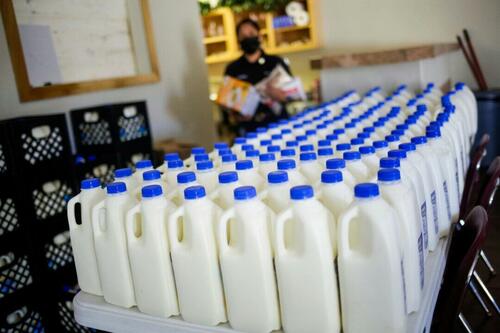
Authored by Zachary Stieber via The Epoch Times (emphasis ours),
Results from early testing show that pasteurization killed highly pathogenic avian influenza in milk, the U.S. Food and Drug Administration (FDA) says.

Results from “an initial limited set of geographically targeted samples” show that “pasteurization is effective in inactivating” the influenza, commonly known as the bird flu, the FDA said in an April 26 update.
The FDA gathered samples from grocery stores with confirmed cases of the flu in cattle. The agency has said that one in five tested positive for avian influenza, but stressed that polymerase chain reaction (PCR) testing can return positive due to residual fragments.
“This additional testing did not detect any live, infectious virus. These results reaffirm our assessment that the commercial milk supply is safe,” the regulatory agency stated.
Testing of samples of powdered infant formula sold at stores also returned negative.
Many infectious disease experts and government officials have said they believe the pasteurization process will inactivate the virus, also known as avian influenza.
“I’m not worried about the milk itself,” said Samuel Alcaine, an associate professor of food science at Cornell University. “It does indicate that the virus is more widespread among dairies than we had previously thought.”
The FDA, which has refused to say how many milk samples tested positive, the sources of the samples that tested positive, and what other products were tested outside milk and formula, is in the process of conducting additional testing. That testing could find milk with live virus intact, agency officials acknowledged.
“The FDA is further assessing retail samples from its study of 297 samples of retail dairy products from 38 states,” it said. “All samples with a PCR positive result are going through egg inoculation tests, a gold-standard for determining if infectious virus is present. These important efforts are ongoing, and we are committed to sharing additional testing results as soon as possible. Subsequent results will help us to further review our assessment that pasteurization is effective against this virus and the commercial milk supply is safe.”
The bird flu has traditionally spread in birds. Cases of H5N1 in cattle began being confirmed in the United States earlier this year. The virus has since been detected in herds in nine states. A herd in Colorado tested positive on April 25, the U.S. Department of Agriculture said.
One person in Texas has had a confirmed case this year and survived the infection.
Worldwide, 28 cases of H5N1 have been reported to the World Health Organization since the beginning of 2021, including the recent case in Texas and a case in the United States in 2022. Some of the patients survived, while others died.
Authorities say that cow-to-cow transmission has occurred. Major questions that remain unanswered include the method of that transmission and whether cows have spread the virus back to birds.
The White House has said that it is monitoring the avian flu situation, launching an “immediate response team” to ensure the safety of the nation’s food supply, monitor trends to mitigate risk and prevent the virus’ spread.
Starting on Monday, the U.S. Department of Agriculture will require dairy cows to test negative for bird flu before they are moved across state lines.
In addition to Colorado, infections among cattle have been confirmed in Texas, Kansas, Michigan, Ohio, Idaho, New Mexico, North Carolina, and South Dakota.
In Indiana, officials are considering potential restrictions, such as testing within the state, even though there are no confirmed cases, according to Bret Marsh, the state veterinarian.
“We’re taking a look here at the state level to see what we may need to do,” he said on a conference call.
Reuters contributed to this report.
Authored by Zachary Stieber via The Epoch Times (emphasis ours),
Results from early testing show that pasteurization killed highly pathogenic avian influenza in milk, the U.S. Food and Drug Administration (FDA) says.

Results from “an initial limited set of geographically targeted samples” show that “pasteurization is effective in inactivating” the influenza, commonly known as the bird flu, the FDA said in an April 26 update.
The FDA gathered samples from grocery stores with confirmed cases of the flu in cattle. The agency has said that one in five tested positive for avian influenza, but stressed that polymerase chain reaction (PCR) testing can return positive due to residual fragments.
“This additional testing did not detect any live, infectious virus. These results reaffirm our assessment that the commercial milk supply is safe,” the regulatory agency stated.
Testing of samples of powdered infant formula sold at stores also returned negative.
Many infectious disease experts and government officials have said they believe the pasteurization process will inactivate the virus, also known as avian influenza.
“I’m not worried about the milk itself,” said Samuel Alcaine, an associate professor of food science at Cornell University. “It does indicate that the virus is more widespread among dairies than we had previously thought.”
The FDA, which has refused to say how many milk samples tested positive, the sources of the samples that tested positive, and what other products were tested outside milk and formula, is in the process of conducting additional testing. That testing could find milk with live virus intact, agency officials acknowledged.
“The FDA is further assessing retail samples from its study of 297 samples of retail dairy products from 38 states,” it said. “All samples with a PCR positive result are going through egg inoculation tests, a gold-standard for determining if infectious virus is present. These important efforts are ongoing, and we are committed to sharing additional testing results as soon as possible. Subsequent results will help us to further review our assessment that pasteurization is effective against this virus and the commercial milk supply is safe.”
The bird flu has traditionally spread in birds. Cases of H5N1 in cattle began being confirmed in the United States earlier this year. The virus has since been detected in herds in nine states. A herd in Colorado tested positive on April 25, the U.S. Department of Agriculture said.
One person in Texas has had a confirmed case this year and survived the infection.
Worldwide, 28 cases of H5N1 have been reported to the World Health Organization since the beginning of 2021, including the recent case in Texas and a case in the United States in 2022. Some of the patients survived, while others died.
Authorities say that cow-to-cow transmission has occurred. Major questions that remain unanswered include the method of that transmission and whether cows have spread the virus back to birds.
The White House has said that it is monitoring the avian flu situation, launching an “immediate response team” to ensure the safety of the nation’s food supply, monitor trends to mitigate risk and prevent the virus’ spread.
Starting on Monday, the U.S. Department of Agriculture will require dairy cows to test negative for bird flu before they are moved across state lines.
In addition to Colorado, infections among cattle have been confirmed in Texas, Kansas, Michigan, Ohio, Idaho, New Mexico, North Carolina, and South Dakota.
In Indiana, officials are considering potential restrictions, such as testing within the state, even though there are no confirmed cases, according to Bret Marsh, the state veterinarian.
“We’re taking a look here at the state level to see what we may need to do,” he said on a conference call.
Reuters contributed to this report.
Loading…





